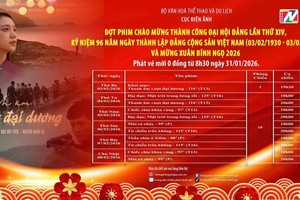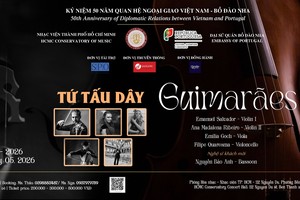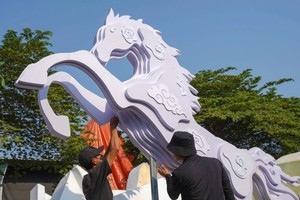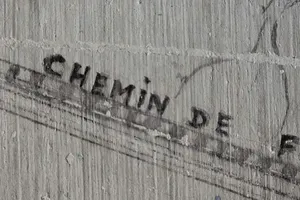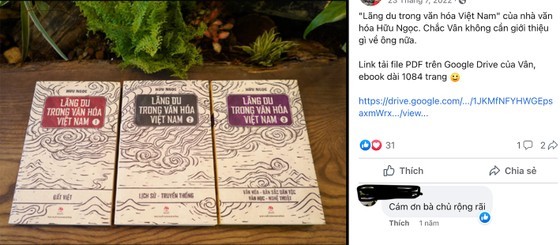 |
Readers' awareness is lifesaver in the fight against book piracy |
Despite many proposed solutions such as smart stamps from Tre Publishing House, or Social books from Anbooks introduced to prevent fake and pirated books, ongoing efforts to fight book piracy seemed to be ineffective.
In addition to paper books, Thai Ha Books Company (Thaihabooks) has also used Fonos Application to make audiobooks. According to Ms. Vu Thuy, Copyright Director of Thaihabooks, up to 70 percent of Thaihabooks' audiobooks are being currently released on the market have been pirated by other units. Every month Fonos sends a report about Thaihabooks' audiobook copyright infringement in great detail.
In the report, it is easy to see that on average there are more than 40 websites releasing non-copyrighted audiobooks in different forms such as each chapter of a book, then posting them one by one to the channel intending to circumvent censorship. Some channel owners will use the form of introducing books, but reading and quoting more than 20 percent of the book's content which exceeds the regulations of the Intellectual Property Law, or even nearly the entire content of a book, said Ms. Vu Thuy.
According to Mr. Nguyen Nguyen, Director of the Department of Publishing, Printing and Distribution under the Ministry of Information and Communications, book copyright infringement in cyberspace currently has three common forms like selling counterfeit printed book products and pirated books on various e-commerce platforms, popular social networks; using licensed OTT websites, applications (apps), websites that register domain names and place servers abroad, pirated OTT apps shared on the internet, popular social networks to provide digital book products (reading, listening, viewing); taking advantage of digital technology, especially artificial intelligence (AI) technology, to create derivative works but not complying with regulations on copyright and related rights.
 |
Young people are choosing books with discount |
Digital copyright violations are increasingly diverse and difficult to control. Although Vietnamese authors and publishing houses have proactively implemented a number of solutions but these measures have not been carried out synchronously resulting in undesirable results. Along with that, many consumers still do not say no to pirated book products. Consequently, pirated books are rampant in the market leaving a negative impact on the development orientation of reading culture and consumer culture of readers, Mr. Nguyen Nguyen shared.
One of the solutions that publishing houses can do in the current context is to apply technology. Ms. Le Thi Phuong Thao, Operations Director of V&V Technology Solutions Investment and Development Joint Stock Company, said that applying technology solutions will help better protect the intellectual property rights of authors. V&V Company is implementing a number of technical solutions such as DRM (Digital Rights Management), Watermarking, and Blockchain technology.
Currently, many readers still believe that sharing e-books online for free is helping each other, and even they are considering sharing e-books will help improve reading culture. However, many people innocently share many non-copyrighted publications publicly on their personal pages for friends to download.
It is worth mentioning that many of these publications are being copyrighted by business publishing units such as Nhan chung cuoi cung (the Last Witness) of the Vietnamese Women's Publishing House; Suoi nguon (The Fountainhead), Co don tren mang (Loneliness in the Internet) both of the Tre Publishing House; Tron chay (Runaway), Vo tri (Senseless), Trieu phu o chuot (Slumdog Millionaire) of the Nha Nam Publishing House.
In the strategy to prevent pirated books, people mentioned most is raising awareness among readers. Ms. Dinh Thi Thanh Thuy, former Director of Ho Chi Minh City General Publishing House cum Vice President of the Vietnam Publishing Association, said that the lives and income of many Vietnamese people are not high enough to be able to spend money on buying good books.
But if readers accept buying fake books at cheap prices, the publishing industry will not develop. Readers with good awareness who consciously buy real books are contributing to building Vietnam's good image in the world publishing market and people around the world will respect the country more.
Book piracy will influence authors’ living standards. If authors can no longer earn a living from their writing, the supply of writing will inevitably diminish. For these reasons, book piracy is harmful to authors, publishers, booksellers and readers alike.
Lawyer Phan Vu Tuan, Head of Phan Law Vietnam Law Office, pointed out that the culprit of most violations is the low awareness of a number of Vietnamese readers. Many people believe that when they read books, they want to enjoy the book's content, rather than about copyright issues.
He cited that many people will naturally decide to download and read books for free instead of buying high-cost paper books. Therefore, the best measure to prevent copyright infringement in the digital environment must come from the public's awareness of not using, posting, or sharing books that are infringing copyright, Lawyer Phan Vu Tuan analyzed.
In fact, many readers buy fake and pirated books because they don't know and are trapped by attractive advertisements. According to Ms. Hoai An, a media representative of Dong A Book Company, readers should come to big bookstores to avoid buying pirated and fake books.
Ms. Dinh Thi Thanh Thuy - Director of Ho Chi Minh City General Publishing House, Vice President of the Vietnam Publishing Association, moaned Vietnam's reputation with the world is being eroded – an extremely serious consequence of consuming fake and pirated books. Ms. Thanh Thuy disclosed that during the Frankfurt Book Fair in October 2023, through a number of contacts and exchanges with bookmakers and publishers in the globe, she sensed that in international peers’ eyes, Vietnam is not a country with good copyright.
Ms. Dinh Thi Thanh Thuy also said that when a country's reputation for protecting intellectual property rights is reduced, it will lead to the loss of many opportunities for publishing units when trading copyrights to obtain good works.
